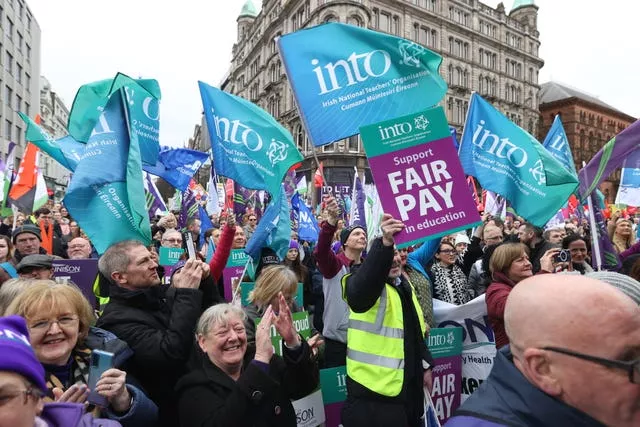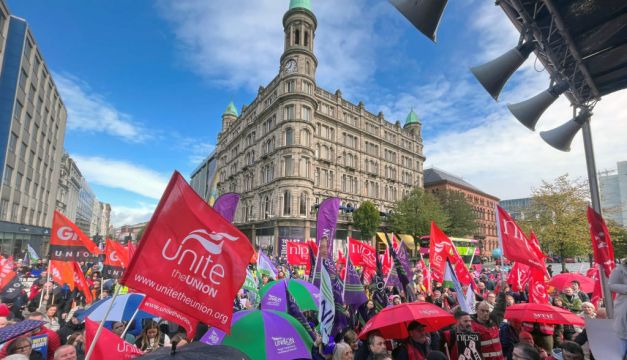Industrial action will impact schools and hospitals across the North as multiple unions have announced strike action on the same day in January.
The Irish Congress of Trade Unions (ICTU) has deemed January 18th the ‘generalised day of action’ in response to the conclusion of talks on restoration of the Northern Ireland executive.
Unions representing health workers, midwives, radiographers, teachers and civil servants are among those who have said they will withdraw their labour for some length of time on the day.

Devolved government in the region has not been functional for over a year due to the DUP's ongoing boycott of power-sharing institutions in protest against post-Brexit trading arrangements of the protocol and the Windsor framework.
On Tuesday the Northern Ireland Secretary Chris Heaton-Harris said the British government’s negotiations with the DUP in relation to the Windsor framework had concluded.
However, DUP leader Jeffrey Donaldson said that talks over unionist concerns about trading arrangements would continue.
As part of a financial package that is conditional on parties returning to governance at Stormont, Mr Heaton-Harris announced up to £584 million (€678 million) for public sector pay claims as a non-repayable reserve claim.
Workers from across healthcare, teaching and transport have been on strike at various stages across 2023 because of an ongoing lack of pay parity with their counterparts in the rest of the UK who have achieved a pay rise.
ICTU assistant general secretary Gerry Murphy said workers in the North “cannot be held hostage” by a lack of governance.
“The Secretary of State has accepted that public sector pay needs to be settled and has admitted that he has the money to settle it,” he said.
“A worker’s pay is not some bauble to be dangled in a political negotiation. This money must be made available to settle this dispute now”.
“The financial package outlined during this talks process represents a necessary shift in the UK government’s attitude, but it does not appear that it will be sufficient. We want to see the restoration of the NI executive so that we can begin to bring some stability to public services here.”

Mr Murphy said that strike action would escalate as long as a pay deal was not awarded.
“In the absence of any movement on these issues, trade unions in Northern Ireland have no option but to intensify our programme of industrial action,” he said.
“The next step will be generalised day of action on the 18th of January bringing together all workers currently in dispute.
“Over the past year, almost every union has taken action short of strike action, and intermittent strike action, on the back of unprecedented support from members. Already, several unions have declared that they will be taking strike action on Thursday 18 January, and this will affect every part of public services.”
The unions that have declared strike action so far include Unison, GMB, SoR (Society of Radiographers), NAHT (National Association of Headteachers), NIPSA (Representing civil servants), RCM (Royal College of Midwives), Unite, NASUWT (the teachers’ union), INTO (Irish National Teachers Organisation), CSP (Charted Society of Physiotherapists), UTU (Ulster Teacher’s Union) and BDA (British Dietetic Association).
ICTU have said they are expecting more unions to declare action over the coming weeks.
RCM said nine out of 10 midwives said they would take strike action if no pay deal was agreed.

RCM’s director for Northern Ireland, Karen Murray, said their members had “been pushed too far and enough is enough”.
“The RCM had been hopeful that the executive would be reinstated by now, and that we could have worked towards a resolution on pay before Christmas. Unfortunately, this has not happened,” she said.
“Our members have been more than patient, seeing their counterparts in Scotland, Wales and England getting pay uplifts while their own stands still.
“No midwife wants to take strike action, but our patience has run out.”
The RCM has reassured women and their families using maternity services that this planned industrial action will not impact the delivery of safe services.
Ms Murray said RCM members are “overstretched and under enormous pressure to deliver safe care.”
“Day in, day out, midwives work flat out to help deliver safe and high-quality care for women, babies and their families. Maternity services in Northern Ireland cannot continue to run on the goodwill of our hardworking members. Goodwill does not pay the bills,” she said.
“Moreover, morale is low, and midwives feel so undervalued, there is palpable frustration that here we are starting 2024 with no resolution to this pay dispute.”







